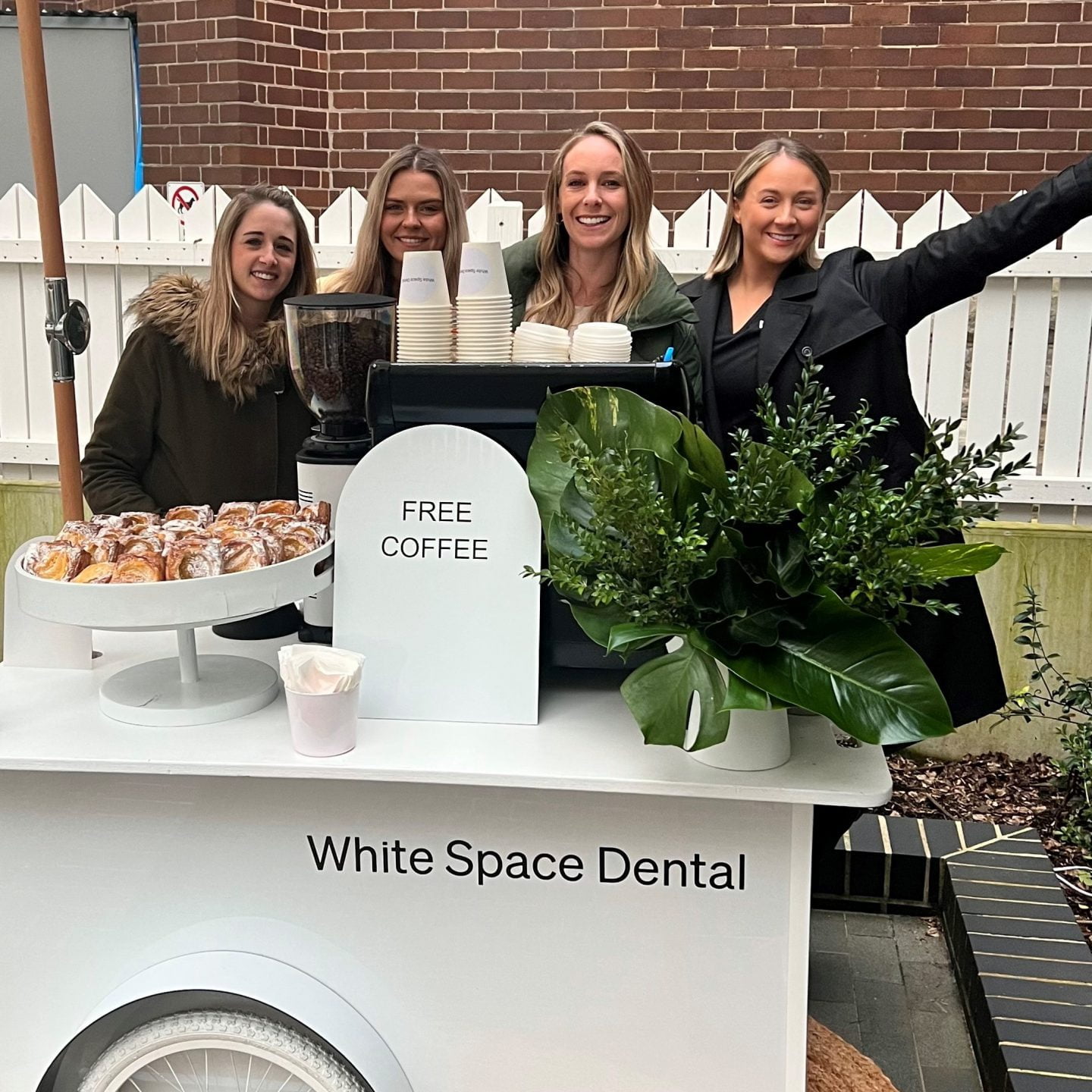Can’t start the day without a coffee? No judgement here – we completely get it! So rather than telling you to avoid your favourite brew, we want to reassure you that there are ways you can enjoy your coffee and keep your teeth white.
We’re here to offer our top tips and advice to reduce the impact of coffee stains on your teeth, so you can live your best life.

Why does coffee stain my teeth?
Coffee is great, but you know what’s not so great? The visible stains it can leave on your teeth. This is because coffee contains ingredients called tannins, the pigments of which can settle into the tiny ridges in the surface of your teeth (the enamel) and cause them to stain. It’s the same with tea and wine.
But it’s not all bad news! Coffee stains or discolouration on teeth is only cosmetic and can be easily remedied.
Our Best Tips to Reduce Coffee-Stains on Your White Teeth
Drink water
Don’t worry, we’re not telling you to swap your coffee for water! Instead, make sure you alternate sips of coffee with water or have a drink of water immediately after you finish your coffee. The acidic nature of coffee can wear away the enamel over time, so we want to rinse it off quickly.
Grab a straw
A great way to avoid stains on your teeth is to bypass your teeth entirely! We know this might not be popular with the hot coffee drinkers, but if you’re partial to an iced latte, we recommend drinking through a straw to reduce the risk of stains.
Drink it quickly
Instead of savouring your coffee, and letting it sit on your teeth for longer, you want to be efficient and finish it quickly.
Wait 30 minutes to brush your teeth
This might seem counter-intuitive, but brushing your teeth too soon after consuming acidic food or beverages can weaken your tooth enamel and actually cause staining. Instead, rinse with water as soon as possible, and brush your teeth after 30 minutes.
Eat fruits & vegetables
Raw fruits and vegetables can be a great way to keep your teeth clean, removing plaque and bacteria as you chew. Pineapple is a popular choice as it contains the enzyme bromelain, which acts like a natural stain remover and can even be found in some toothpastes.
Use an electric toothbrush
Swap to an electric toothbrush for more cleaning power – studies have shown that electric toothbrushes (with an oscillating/rotating brush) remove more build up and plaque than manual ones.
Visit White Space Dental for regular check-ups
Removing coffee stains from your teeth is a simple procedure that can be done in the chair at White Space Dental. Be sure to book regular dental cleans twice a year so we can keep your smile shiny and bright.
Get your teeth professionally whitened
The most effective way to beat the toughest coffee stains is to book in for teeth whitening. We offer in-chair whitening for instant results, or a take-home whitening kit that gives you great results in the comfort of your own home.
Are your coffee-stained teeth stopping you from visiting the dentist?
We’re a nation of coffee-lovers. On average, Australians consumed around two kilos of coffee per person last year. Yet a lot of people are embarrassed to admit how much coffee they drink, worried that a trip to the dentist will leave them feeling guilty – or perhaps they avoid making an appointment altogether. This is why we’ve created White Space Dental, a safe space where our patients can feel completely at ease in a judgement-free zone.
Contact us today to see how we can help you achieve the bright smile of your dreams.
Your teeth. Your face. Your smile. Your space.
If you have any questions, our team will be happy to answer them.
Book a consultation today.
White Space Dental
3 Darley Rd
Manly NSW 2095
+61 (02) 7240 0600
[email protected]
References
Coffee market in Australia – statistics & facts
www.statista.com/topics/4615/coffee-market-in-australia
Bromelain: A Natural Approach to Whitening Teeth Effectively
hdl.handle.net/1969.1/194281
A comparative study of stain removal with two electric toothbrushes and a manual brush
pubmed.ncbi.nlm.nih.gov/8624230
